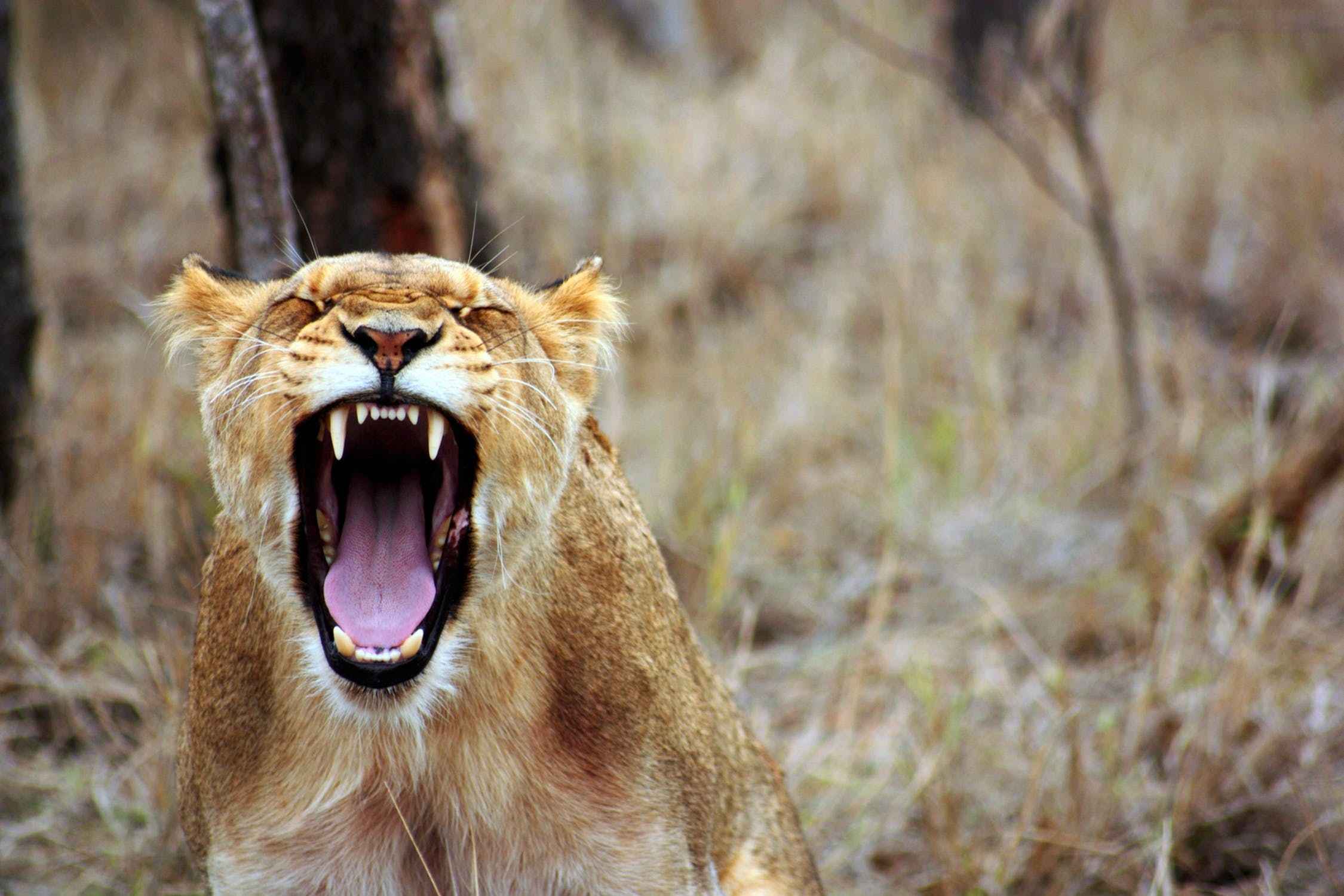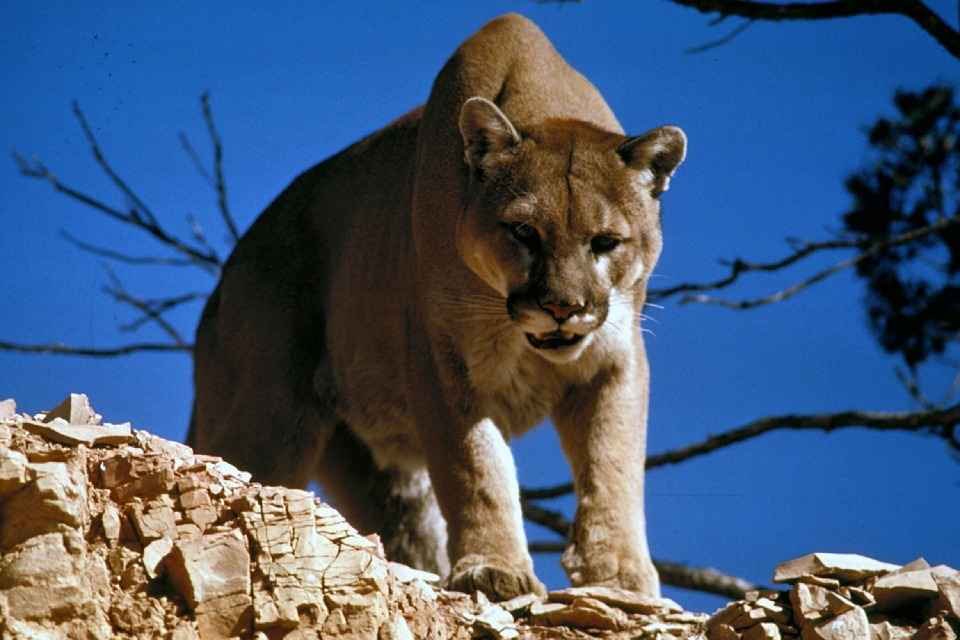 We call lions the king of the jungle. Lions certainly have a reputation for fearlessly dominating their environment.
We call lions the king of the jungle. Lions certainly have a reputation for fearlessly dominating their environment.
It makes us wonder, do lions have any predators?
When investigating lion predators, facts can be surprising.
Do Lions have any Natural Predators?
Not exactly. There are no predators that naturally prey on lions often enough to be considered a key part of their diet, or to affect lion populations. This is an important part of defining a natural predator. However, we could ask a different question: What predator eats lions?
There are several animals that are known to kill and eat lions under certain conditions, and which also diminish lion population numbers in other ways.
This article will cover two different types of lion. They are African lions and mountain lions.
What are African lions’ predators?
As we read above, lions have no true predators. Lions are called apex predators, meaning that they sit at the top of their food chain. Nevertheless, there are animals that do kill and eat lions from time to time. We will start close to the lion’s home.
What eats lions in the Savanna?
If we ask what animals hunt and eat lions, the answer is that no animals make a habit of this behavior. But there are several that will make the best of an opportunity.
Hyenas are an unfriendly neighbor who have been known to kill and eat lions. Hyenas attack lion cubs. They can also team up against weak, sick and old lions. Hyenas are known to eat lion if they get the chance. This BBC Earth video shows hyenas trying to take down a lion, who is fortunate in making a safe escape.
In this case, the lion was unlucky in wandering into the hyenas’ area by mistake. It is much less likely that hyenas would actually go looking for a lion to eat.
Crocodiles are another example of predators that been documented killing and eating lions. Like hyenas, crocodiles do not hunt lions so much as make the best an opportunity when a lion approaches or enters their water.
Besides the dangers for adult lions, their cubs are are often attacked and killed by their rivals.
An unexpected threat
We have read who eats lions in the wild. Let’s zoom out and take a wider look. What animal eats lions outside of natural competitors? What animal has posed the greatest threat to lion populations? Humans.
“Do humans eat lions?” you ask. Yes, sometimes they do.
Lion meat is certainly not a common meal for humans, but there is apparently a market for it. There are literally exotic meat markets that allow people to select from a huge range of unusual meats. Lion is one such possibility.
This article does not endorse consumption of lion meat, but there is evidence that the practice occurs. One perspective can be found in this opinion piece titled “Why I eat lion and other exotic meats”.
There are numerous reasons why this might not be a good idea. Some possible issues include that the trade may be illegal or unethical, and the meat may pose health risks. It is also important to remember that lion numbers are already in decline.
Besides occasionally eating lion, humans are in competition with lions.

What animals compete with lions?
Competition is the key to becoming an enemy of lions. Rivalry could be in the form of sharing the food that is available, or taking over the lion’s habitat.
Humans
Recent research shows that humans compete with lions. As humans take land for farming and construction, they invade animal habitats. Lions’ range, or the width of land they claim as their own territory, has diminished by as much as 75 per cent in the past 20-50 years. In the same years, lion numbers have fallen by 50 per cent. Why are lions disappearing? Not only do humans take over lion territory.
Humans also challenge lions by hunting some of the same animals that lions would normally prey on. Humans threaten lions through hunting and poaching, and sometimes kill lions that have attacked their farm animals. Humans and lions don’t get on well together.
Lions are very visible due to their size and tendency to move in groups. For this reason, and the fact that they aggressively patrol their territories, it is not possible for lions to live peacefully near humans or share land.
Leopards
Leopards are another rival of lions. These cats eat similar prey, except that leopards are more flexible about the space they need and the food they prefer. Leopards are less protective over their space than lions, so it is more possible for leopards to live near humans. For this reason, leopards can more easily get food by attacking domesticated animals. Lions and leopards see one another as enemies, and kill one another’s cubs as often as possible to protect themselves from future competition.
Hyenas
As we have already seen, hyenas are not afraid to kill lions from time to time. In fact, hyenas and lions have a long history as best of enemies.
Hardworking hyenas sometimes do all the work, only for lions to steal their meal. It is not uncommon for lions to chase hungry hyenas away from their own catch. Writers at the Hyena Project say that hyenas can never seem to defend their kill from lions once the lions decide to steal it.
The hyenas may gather in packs and attempt to defend their meal, but will certainly be unsuccessful and left waiting for scraps from after the lions have finished eating.
Lions kill hyenas on a regular basis. The same Hyena Project article says that lions kill more hyenas than any other cause of death. Lions do this by stalking adult hyenas both at rest and while hyenas are hunting. Lions also regularly kill hyena cubs in their dens.
This happens out of competition, not for food. Lions kill hyenas, but they won’t eat them.
Other lions
The most even competition is with other lions. There are several reasons why lions attack and kill other lions. This may happen to defend their territory or mating rights. It is also normal for younger lions to challenge the leader of a pride. This is why lions actively kill other cubs that may one day become competitors. A lion that has managed to take over a new pride will kill existing lion cubs to assert their authority and control the genes within their pride.
Lions are dominant predators, but they have to work hard to defend what is theirs.
Lions’ enemies – African apex predators
Some say that lions are Africa’s number one apex predator. Whether or not they can be considered the top of the food chain, we know they are surrounded by strong competitors.
Among mammals, other apex predators include spotted hyenas, leopards, cheetah, and African wild dogs.
In the air, the number-one predators among birds are eagles. Among these, the most dominant is the martial eagle. These powerful birds are the largest eagles in Africa. Martial eagles have earned an unfavorable reputation for attacking livestock.
The apex predators of African waterways are crocodiles. These ancient reptiles are extremely powerful and stealthy hunters. They can lurk undetected at the water’s edge and pull in prey that is larger than themselves. Crocodiles have even been known to attack small elephants.
The Nile crocodile is the dominant crocodile species in Africa. A great advantage for crocodiles is that other animals, including top predators, need to come to water to drink. This ensures crocodiles a varied diet, plenty of opportunity, and food that comes to them.
There is definitely some degree of competition between these predators as they like to eat similar prey. Their individual habitats mean they can become the most powerful predators of their own environments. However, they often cross into each other’s territories, and there are plenty of examples of these apex predators attacking and killing their rivals.
Lion self-defense
How do lions avoid predators?
Lions are generally fearless and do not have predators to avoid. However, their everyday behavior includes actions that help keep enemies away.
Lions have a strong sense of their territory, and they regularly patrol their land to chase off trespassers. They also show the boundaries of their territories by roaring and using urine to mark areas with their scent.
How do lions defend themselves from predators?
What happens if an attacker, or competing predator, comes too close? A lion’s size and strength are the first defense that will make their attackers think twice. Lions are the only cats with manes, and this feature makes them look more intimidating. The lion’s mane may also protect its neck during a fight.
Lions will stand their ground and face their opponent when under threat. Lions under attack will stand with a posture that allows them to strike if needed, and will try to keep their attacker or attackers in sight at all times. Lions roar to frighten away their opponent, and to communicate with their pride. They may do this to send a warning or call for help.

Mountain lion predators
Like their African relatives, mountain lions are the top of their food chain, and do not have any natural predators. Also known as cougars or pumas, these lions are dominant within their territory. However, sadly, they have also experienced decreasing populations in recent times.
Mountain lions live and hunt within a wide range of space. Research about puma environments shows that they compete with six apex predators. These are gray wolves, grizzly bears, American black bears, jaguars, coyotes and maned wolves. These predators challenge each another by very actively fighting to drive each other out of the area and away from prey.
This Earth Touch article shows that Mountain lions are not always guaranteed to come out on top in a fight. The research says that, “Where the hunting grounds of apex predators overlap, there are always winners and losers.” Rival top predators often show themselves to be evenly matched.
This explains why mountain lions may lose food to competitors within 47.5% of their range. The same article says that they regularly come out second best to black bears, grizzly bears, wolves and jaguars. Mountain lions are more successful in controlling their environment against maned wolves and coyotes.
For these rivals, battles are generally about territory and prey. Mountain lions are not usually killed by other animals as food. For example, wolves in a pack may successfully kill a mountain lion to protect their resources, but the wolves would be unlikely to eat the mountain lion afterwards, unless they were desperate for food.
Are mountain lions aggressive?
Unlike African lions, mountain lions do not fearlessly defend their territory from invaders. Mountain lions do establish and patrol their own territories. However, they are less likely to create aggressive conflict with trespassers. These cats are somewhat timid and will probably hide rather than confront enemies without provocation.
They generally prefer to avoid contact with humans. Despite this fact, mountain lions can and do still attack humans often enough.
This is why it is encouraged for people to take strong precautions when within mountain lion territory. In recent times, there has been a noticeable increase in mountain lion attacks on humans. The good news is that most mountain lion attacks are not fatal for humans.
Humans and mountain lions
If mountain lions are such a strong competitor, why are their numbers declining? Once again, it’s due to their most successful “unnatural” predator: Humans.
Humans have been killing mountain lions for centuries. As humans have expanded into cougar territory, this created competition. Mountain lions adapted to eating livestock. According to the National Wildlife Foundation, mountain lions were heavily hunted during the 1800s and 1900s in the eastern United States, leading to the extinction of the eastern cougar. This rivalry with humans has led to decreasing mountain lion populations across the Americas.
As mountain lions have lost more of their habitat, they have begun to interact more aggressively with humans. Conflicts like this one with a jogger in Colorado show that mountain lions are becoming more bold in their interactions with humans. As a result, certain parts of the United States have put policies in place to control mountain lion populations, and prevent attacks on humans.
Humans may target cougars as a prized trophy to show their hunting abilities. We know that humans like to display our dominance in different ways. To return to the question of mountain lion predators, these cats are starting to surface as a popular source of food for people involved in hunting.
There are even recipes online, like this one, showing how this hunter likes his mountain lion prepared.
Both African lions and mountains lions are apex predators. They have no natural predators. However, they also live amongst strong rivals. While it is uncommon, it is possible for lions to be killed, and even eaten, by competing predators. Humans are the greatest threat to lions, and have already led to a steady decrease in lion populations.






